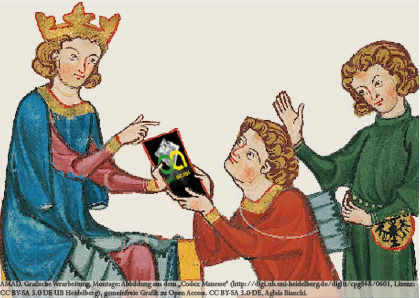AMAD
"Archivum Medii Aevi Digitale - Specialized open access repository for research in the middle ages"To submission

Full metadata record
| DC Field | Value | Language |
|---|---|---|
| Author | Krug, Raphael Matthias | - |
| Date | 2007 | - |
| Other Identifier | https://opus.bibliothek.uni-augsburg.de/opus4/files/473/Krug_Steuerbuecher.pdf | - |
| Other Identifier | https://opus.bibliothek.uni-augsburg.de/opus4/frontdoor/index/index/docId/473 | - |
| Other Identifier | https://nbn-resolving.org/urn:nbn:de:bvb:384-opus-5498 | - |
| URI | https://www.amad.org/jspui/handle/123456789/65727 | - |
| Description | Die Studie beschäftigt sich mit den Anfängen der Steuerbücher in der Reichsstadt Augsburg. Sie existieren seit 1346 und erlauben damit einen Einblick in die Entstehung der mittelalterlichen städtischen Finanzverwaltung. Mit den aus früheren Jahren überlieferten Bruchstücken der städtischen (Finanz-)Schriftlichkeit konnte ein Bild der sich kontinuierlich entwickelnden Verwaltung aufgezeigt werden, deren Schwerpunkt lange rein fiskalische Sachverhalte bildeten. Neben diesen Aspekten wurde die Sozial- und Wirtschaftsgeschichte Augsburgs im 14. Jahrhundert seit Entstehung der Steuerbücher anhand einer stichprobenartigen Auswertung von diesen untersucht. Aufgezeigt werden konnten ein Aufschwung bis zum Ende der 1360er-Jahre, sowie daran anschließend ein Rückgang an Steuerzahlern bis 1400. Ursächlich für den Rückgang dürften weniger Seuchen als vielmehr die wirtschaftliche und gesellschaftliche Situation zu dieser Zeit gewesen sein, war doch das letzte Drittel des 14. Jahrhunderts von Konflikten geprägt, darunter der Städtekrieg von 1388/89. ; This research is dealing with the taxbooks of the "Reichsstadt" Augsburg. This books exist since 1346 and offer therefor an insight into the development of medieval fiscal administration. Together with fragments of earlier urban (fiscal)writings it was possible to get an idea of the developing urban administration, which had its main focus on fiscal issues. Besides this aspects another focus lay on the social and economical history of Augsburg under the 14th century beginning with the start of the taxbooks. For this a sample of the taxbooks was used. It could be shown that after an upswing until around 1368, a decline took place until 1400. This happened not due to epidemics as the Black Death, but rather because of the economic and social situation in this time, as the last third of the 14th century was shaped by conflicts amongst others the "Städtekrieg 1388/89". | - |
| Format | application/pdf | - |
| Language | ger | - |
| Rights | info:eu-repo/semantics/openAccess | - |
| Keywords | ddc:943 | - |
| Keywords | Mittelalter | - |
| Dewey Decimal Classification | 940 | - |
| Title | Es ist doch zem Jungsten ein end daran : Die Augsburger Steuerbücher im Spätmittelalter (1346-1430) als Medium städtischer Verwaltung ; Es ist doch zem Jungsten ein end daran : Taxbooks of Late Medieval Augsburg (1346-1430) as Medium of Urban Administration | - |
| Type | doctoralthesis | - |
| Type | doc-type:doctoralThesis | - |
| AMAD ID | 520838 | - |
| Year | 2007 | - |
| Open Access | 1 | - |
| Appears in Collections: | BASE (Bielefeld Academic Search Engine) General history of Europe | |
Files in This Item:
There are no files associated with this item.
Items in DSpace are protected by copyright, with all rights reserved, unless otherwise indicated.

